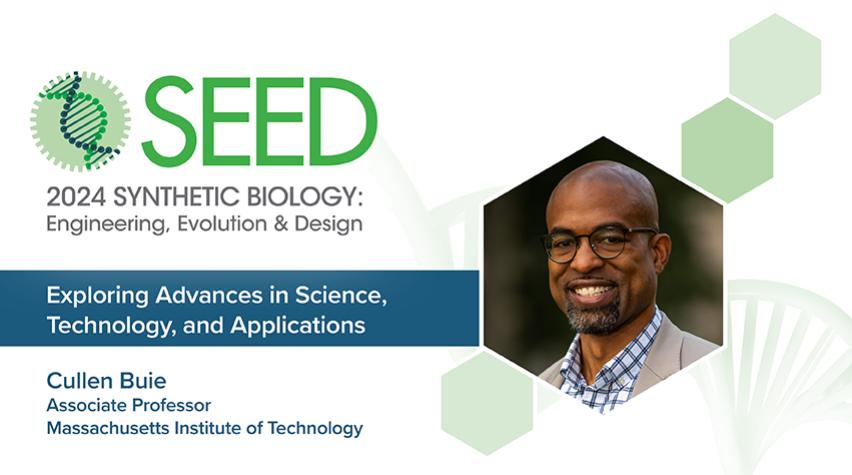
Organized by AIChE’s Society for Biological Engineering (SBE), the 2024 Synthetic Biology: Engineering, Evolution & Design (SEED) Conference will be held June 24–June 27 in Atlanta, GA, USA. Covering the field from its foundations to its commercial applications, SEED’s expert-led sessions offer insights into next-generation development strategies, incorporating perspectives from research institutions and industry. Funding opportunities are available to attend this event. Reserve your spot today.
We caught up with SEED conference speaker Cullen Buie, Associate Professor at the Massachusetts Institute of Technology, to discuss the future of synthetic biology, and what he’ll be speaking about at SEED.
What inspired you to do research in this field?
Ten years ago, I had been working on fuel cells, batteries, and alternative energy storage solutions. I was looking to branch out into new fields and found myself in a DoD-sponsored workshop in the Boston area on synthetic biology. I had never heard of the field at the time and was fascinated by the vision to use biology in fresh new ways for the benefit of mankind. While speaking with conference attendees, I learned that one of the bottlenecks in the field could be genetic transformation, particularly in the case of undomesticated bacterial species. This inspired my research group to begin looking at enhancing our understanding of the transformation process and designing systems to make it more scalable.
How do you envision this field solving some of the challenges in engineering and society?
Two areas where I believe this field can have major impacts are in human health and the environment. With respect to human health, there is a tremendous opportunity to use living cells, both human and microbial, to influence the course of disease. As time progresses, we will see more applications where principles of synthetic biology are used to modify cells for therapeutic or prophylactic purposes. In regards to the environment, synthetic biology will play a huge role in helping humanity maximize our resources. Applications ranging from bio-derived materials to food will influence our ability to support the human population in a more sustainable manner.
Are there any new developments, technologies, or applications of technologies in this field that you are particularly excited about?
I am particularly excited by developments in next-generation gene therapies. As we seek to address more and more complicated diseases with diverse types of cells, synthetic biology will play a central role. For example, in the case of in vivo human gene editing, there is a huge need to design safe genetic payloads that only get expressed by the cell of interest. It’s exceedingly difficult to target one particular organ or cell type in vivo without stray delivery to other cells in the body. Genetic safeguards, which have been under development by those in synthetic biology for years, are proving crucial in the effort to design safe in vivo gene therapies for humans.
What is the one big takeaway that you would like audiences to gain from your talk?
My research group has been designing platforms to make electric-field-based genetic transformation more scalable. This includes systems that facilitate transformation of large volumes of cells and systems that facilitate high throughput parallelization of transformation experiments. One of the potential benefits of these systems is to enable genetic manipulation of currently intractable strains. However, the biggest benefit is that the scale of questions that can be asked has increased. The large volume system we’ve developed operates several orders of magnitude faster than traditional electroporation cuvettes. This means that it’s possible to create substantial mutant libraries even in cases where transformation efficiency is low. Further, the high throughput automated platform can perform thousands of individual experiments in a day. This can be used for optimizing transformation conditions, optimizing gene editing payloads, identifying genetic targets, or creating arrayed libraries. My hope is that the audience will see that there are new questions that can be asked due to the scale at which our technologies perform.
We may receive funding to help sponsor some registrations for SEED 2024. U.S.-based students, post-docs, and early-career professionals are encouraged to apply for a grant.
About SBE
Established in 2004, the Society for Biological Engineering is a technological community for engineers and applied scientists integrating biology with engineering. Members of SBE come from a broad spectrum of industries and disciplines and share in SBE’s mission of realizing the benefits of bioprocessing, biomedical and biomolecular applications. Learn more about SBE.


